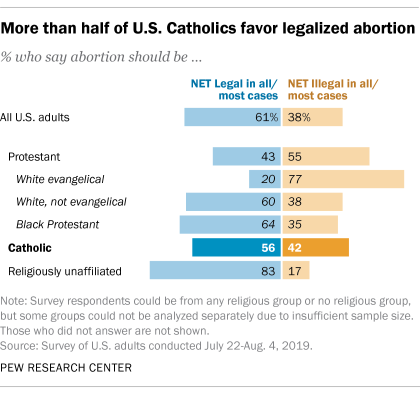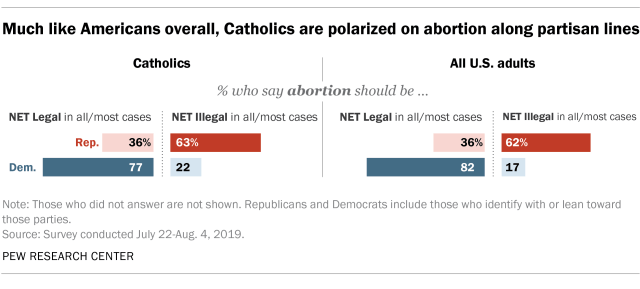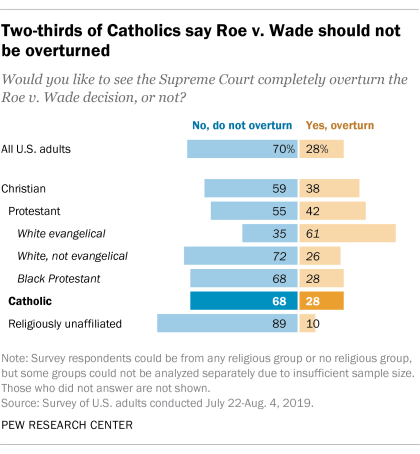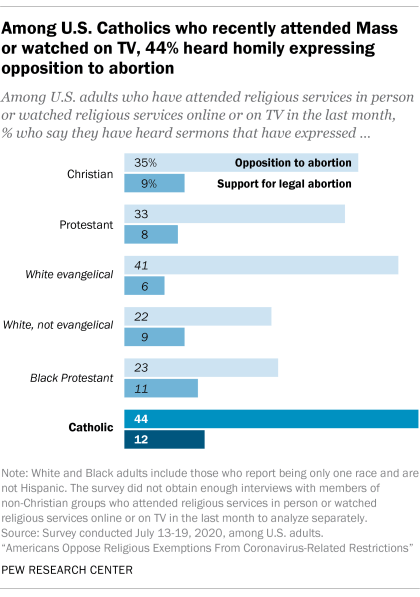8 key findings about Catholics and abortion

As the Senate prepares to vote on Amy Coney Barrett’s appointment to the U.S. Supreme Court, public attention has focused on her Catholic faith and, in particular, her stance on abortion rights.
Some critics, citing Barrett’s past rulings on abortion, have questioned her views on Roe v. Wade, the landmark Supreme Court decision that established a woman’s right to abortion. Others have connected Barrett’s legal opinions to her embrace of Catholic teachings, which prohibit abortion. During Senate hearings last week, Barrett declined to give specific answers about her stance on Roe v. Wade, saying that she does not have “any agenda.” If she is confirmed, Barrett will be the sixth Catholic justice on the court.
In practice, Catholics’ views on abortion are not always aligned with the guidance of their church. Like U.S. adults overall, the majority of U.S. Catholics say abortion should be legal – at least in some cases – as do many Catholic legislators and other politicians. Democratic presidential candidate Joe Biden, who often describes himself as a devout Catholic, has said women have a constitutional right to abortion and has vowed to uphold Roe v. Wade, although he has in the past backed curbs on abortion.
Pew Research Center has asked Catholic adults their views on abortion many times over the years, including in a 2019 survey that addressed Roe directly. Here is a compilation of key findings from these surveys.
More than half of U.S. Catholics (56%) said abortion should be legal in all or most cases, while roughly four-in-ten (42%) said it should be illegal in all or most cases, according to the 2019 Pew Research Center survey. Although most Catholics generally approve of legalized abortion, the vast majority favor at least some restrictions. For example, while roughly one-third of Catholics (35%) said abortion should be legal in most cases, only around one-fifth (21%) said it should be legal in all cases. By the same token, 28% of Catholics said abortion should be illegal in most cases, while half as many (14%) said it should be illegal in all cases.
Compared with other Christian groups analyzed in the data, Catholics were about as likely as White Protestants who are not evangelical (60%) and Black Protestants (64%) to support legal abortion, and much more likely than White evangelical Protestants (20%) to do so. Among Americans who are religiously unaffiliated – those who say they are atheist, agnostic or “nothing in particular” – the vast majority (83%) said abortion should be legal in all or most cases.
Catholics who regularly attend Mass show higher levels of opposition to abortion. Two-thirds of Catholics who attend Mass weekly or more often (67%) said abortion should be illegal in all or most cases, while one-in-three (33%) said it should be legal. The ratio is almost exactly reversed for those who attend less frequently: Among Catholics who attend Mass less than weekly, roughly two-thirds said abortion should be legal in all or most cases (65%), while approximately one-in-three (32%) said it should be illegal in all or most cases.
Like Americans overall, Catholics are divided by party on the question of whether abortion should be legal. Most Catholics who identify as Republican or lean toward the Republican Party (63%) said abortion should be illegal in all or most cases, while an even larger share of Catholics who identify as Democrats or lean that way (77%) said abortion should be legal in all or most cases, the 2019 survey showed. Still, roughly one-third of Catholic Republicans (36%) favored legal abortion, while 17% of Catholic Democrats opposed it, reflecting some dissent within both parties on this issue.
Catholics are about as likely as other Americans to see abortion as a key election issue. Among Catholics, 39% say abortion is “very important” in informing their choice in the 2020 presidential election, as do 38% of U.S. adults overall, according to a survey conducted in July and August of this year. (By comparison, 61% of White evangelical Protestants say abortion is crucial to their vote.) This puts abortion lower on the priority list – for both Catholics and Americans overall – than other key issues such as the economy, health care and the coronavirus outbreak, with majorities in both groups rating these as “very important” to their decision. When it comes to prioritizing Supreme Court appointments as an election issue, Catholics (61%) and U.S. adults overall (57%) again are about equally likely to say it’s “very important” to their vote.
Like U.S. adults overall, most Catholics said in the 2019 survey that they oppose overturning Roe v. Wade. Roughly two-thirds of Catholics (68%) said they do not want the Supreme Court to completely overturn the landmark decision, while almost three-in-ten (28%) said the ruling should be overturned. This gap was almost identical to the division in the U.S. public overall (70% vs. 28%). But opinions varied widely by religious affiliation: 89% of unaffiliated Americans said Roe v. Wade should remain in place, compared with only 35% of White evangelical Protestants.
Even though most Catholics said abortion should generally be legal, a majority also said abortion is morally wrong. In fact, the share who said that abortion is morally wrong (57%), according to data from a 2017 survey, and the share who said it should be legal (56%) are almost identical. Among adults in other religious groups, there was a wide range of opinions on this question: Almost two-thirds of Protestants (64%) said abortion is morally wrong, including 77% of those who identify with evangelical Protestant denominations. Among the religiously unaffiliated, the vast majority said abortion is morally acceptable (34%) or not a moral issue (42%).
When it comes to views of the Supreme Court, Catholics are about as likely as other Christians to have a favorable opinion. Three-quarters of Catholics (76%) say they have a positive view of the high court, while roughly a quarter (23%) have a negative view, according to a Pew Research Center survey conducted in August 2020. In addition, roughly seven-in-ten Catholics (72%) said the Supreme Court is neutral toward religion, while equal shares said it is friendly (13%) or unfriendly (13%), according to a survey conducted in 2019. Non-Christian respondents were much more likely to say the Supreme Court is friendly toward religion rather than unfriendly: That was the case for Jews (29% vs. 3%), for example, and for the religiously unaffiliated (26% vs. 7%).
More than four-in-ten Catholic churchgoers say they have recently heard a sermon expressing opposition to abortion. In a survey conducted this summer, Pew Research Center asked U.S. adults who had recently attended religious services in person or watched online or on TV whether they had heard certain topics addressed in sermons. Among Catholics, 44% had heard homilies that expressed opposition to abortion in the past month, while 12% had heard homilies that expressed support for legal abortion. Among Protestants, 33% had heard messages opposing abortion.
But not all Catholics trust their clergy’s advice on abortion, according to a survey conducted in 2019. Roughly one-third of Catholics overall said they have “a lot” of confidence (34%) that their clergy can provide useful guidance on this topic, while an additional one-third had “some” confidence (33%). Among White evangelical Protestants, by comparison, 59% had a lot of confidence in their clergy’s advice on abortion, and another quarter (26%) had some confidence.




No comments:
Post a Comment